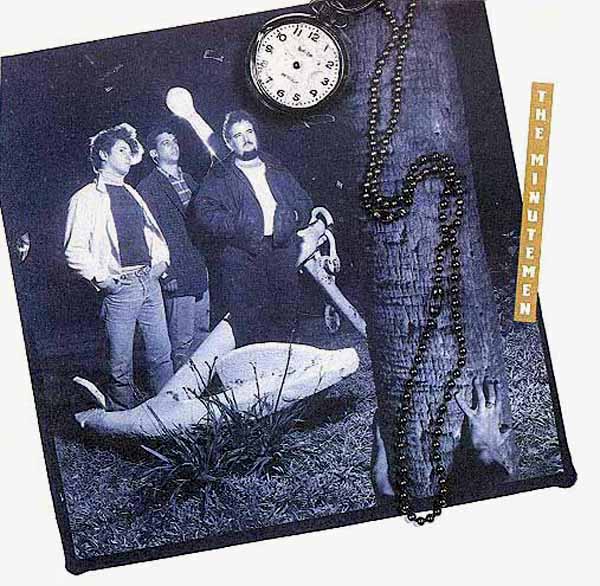
Perhaps more than anything else, Black Flag wants to shake up its audience. "I find it really distasteful to have a band that plays to me what I want to hear," says Greg Ginn. "That's no kind of expression. We don't play to satisfy an audience. We play what we want them to hear. If you love your audience, you try to bring them something they don't already have. You don't play totheir current sensibilities and not give them anything that would threaten them. To me, that shows a total disrespect for an audience.
"IF YOU WORK FOR SST
Records you have to be prepared to sleep on the floor," says Jordan Schwartz, 21. That's just what Jordan and Black Flag manager Chuck Dukowski do. They sleep on the floor of the messy office in Redondo Beach, which, along with a cramped, low-ceilinged downstairs rehearsal room, serves as Black Flag's base of operations.
SST is the most important underground record label in America. As the Los Angeles Times noted not long ago, "The company [SST] has matured into a showcase for some of the best alternative rock bands in the country." In addition to Black Flag, other acts include the Minutemen, the Meat Puppets and Hüsker Dü. In its five-year existence SST has released over forty recordings, eighteen of which are LPs. Last year alone SST released four albums by Black Flag as well as double albums by the Minutemen and by Hüsker Dü and albums by the Meat Puppets, Saccharine Trust and St. Vitus.
SST is just one of a group of underfinanced, low-budget underground labels — San Francisco's Subterranean and Minneapolis' Twin/Tone are two others — which have been recording bands that the major labels have either overlooked or dismissed as uncommercial. "Me and my friends wanted to record the punk-rock scene," says Steve Tupper, 38, explaining why he formed Subterranean Records [Cont. on 124]
Unlike the punks of the Seventies, this new generation also has some respect for the hippies and the values they embraced in the Sixties. Around the Black Flag office and rehearsal room, in Redondo Beach, California, one frequently sees long-haired roadies wearing Grateful Dead T-shirts and playing Aoxomoxoa or Workingman's Dead on their boom boxes. Greg Ginn says one of his dreams is for Black Flag to open for the Grateful Dead. "It seems like a lot of the things that happened in the Sixties — freedom, having an open attitude — are being replaced by a new puritanism," complains Ginn. "It's time to loosen it up. A lot of stuff done in the Sixties was important."
IF YOU SAW HENRY ROLLINS hitch-hiking, you wouldn't stop to pick him up. He looks like a psychopathic hippie, part Jim Morrison, part Charles Manson. Real
Get close to him — it's downright scary. Eyes that bore right through you. Hair, a tangled mess that falls past his shoulders, down his back. Ragged, ripped clothing. Lots of tattoos: skulls and snakes, ghouls, a spider, a bat. And, etched across his upper back in inch-high letters, Henry Rollins' philosophy of life: SEARCH & DESTROY.
"I think you really got to look at it deeper than surface level," says Rollins. I mean, the way I look — this is only skin. Perhaps, but Rollins' image — and the way it alienates him from so much of socirty — in many ways characterizes the relationship between Black Flag and mainstream America. "I guess we offend a lot of people," Rollind has said. "The hair length, the way we look, the way we dress isn't conducive to one-way thinking."
An aura of dark violence hangs in the air around Black Flag, like soot from a turn-of-the-century factory smokestack. Sitting in a hamburger joint down the street from Black Flag's office, Rollins wolfs down a burger and stares at several kids glued to videogames. "Life, for a lot of people, is a very surface-level experience," he says. "I see these lard-assed kids in front of these
Black Flag has been associated — unfairly, its members claim — with punk violence since the late Seventies. People have accused the band with being sexist, racist and fascist. The group was forced to move out od three L.A. communities. "Our whole thing has beenmade out to be brutal, fascistic and violent," says Rollins, who does not drink or use drugs. "Those are three things that we're very much not into at all. We're not violent. We're not evil. We don't like to see anybody hurt at any time. I don't like to see violence at anybody's shows. I've seen more violence at Van Halen than at any of our gigs."
While Black Flag's music no longer resembles the punk of the past, there are similarities between a late-Seventies Sex Pistols concert